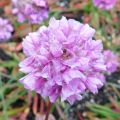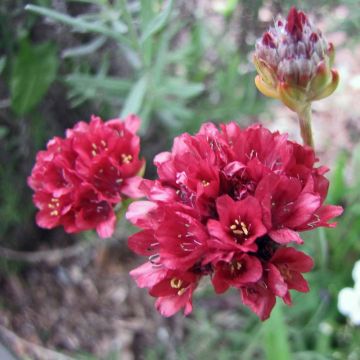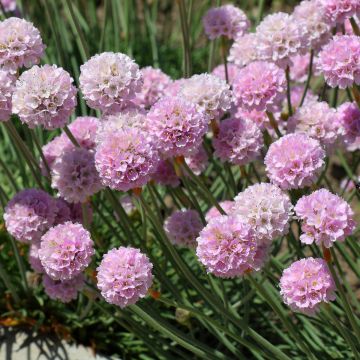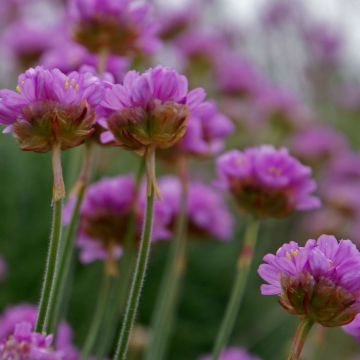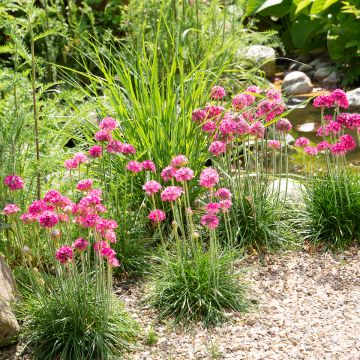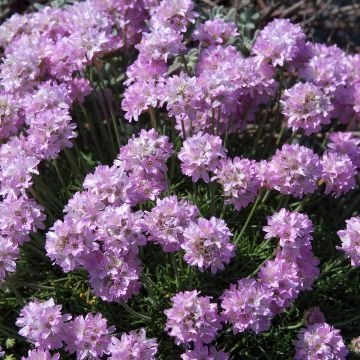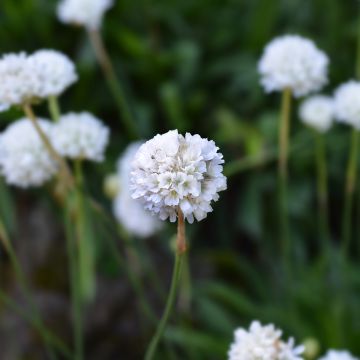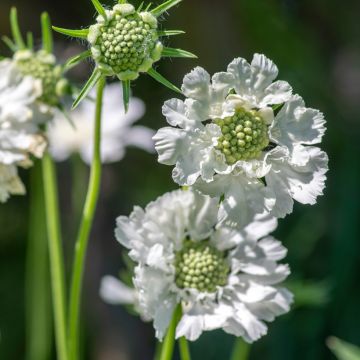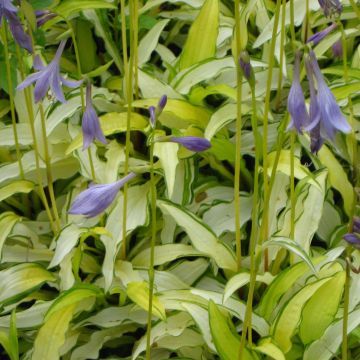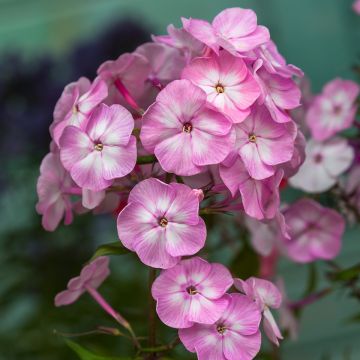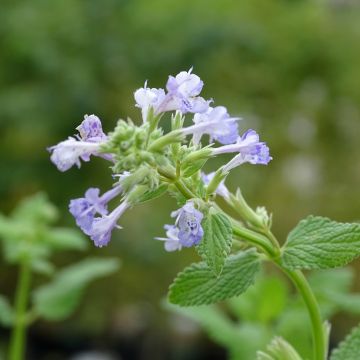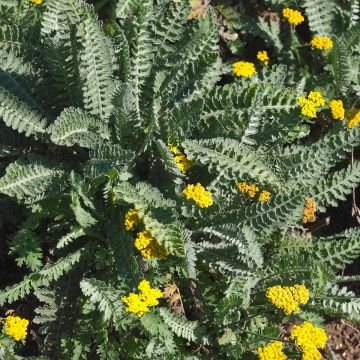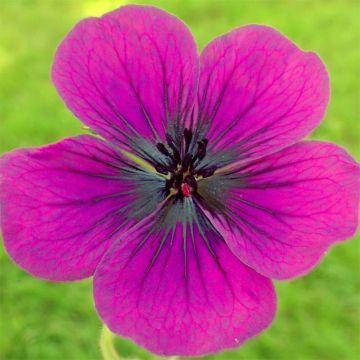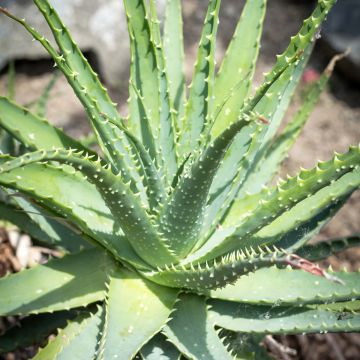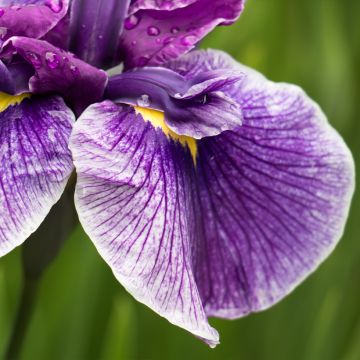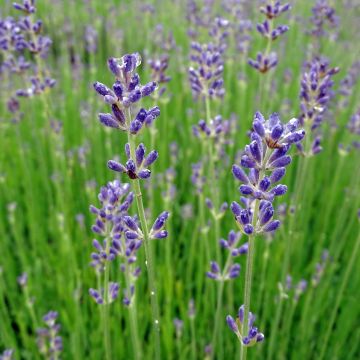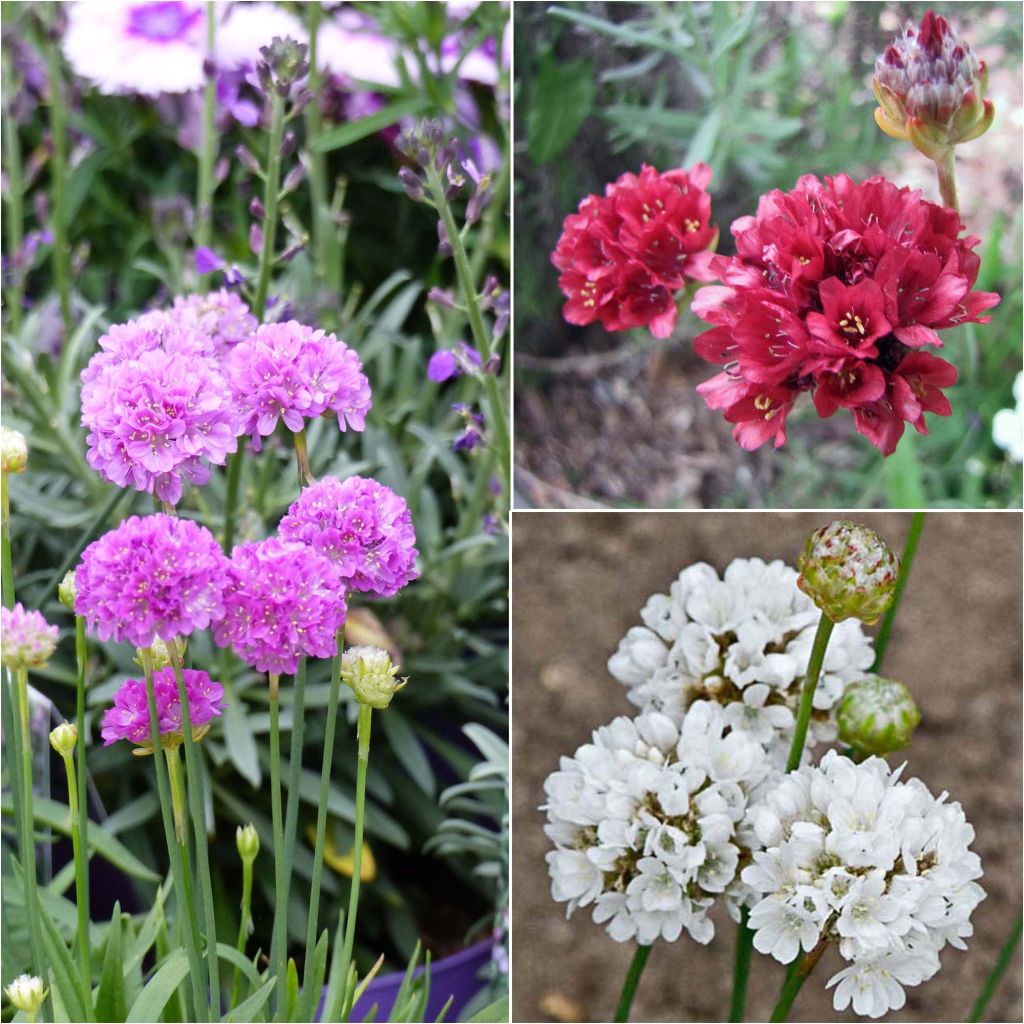

Collection of 3 Armeria pseudarmeria Ballerina
Collection of 3 Armeria pseudarmeria Ballerina
Armeria pseudarmeria Ballerina Red, Ballerina Lilac, Ballerina White
Oeillet de Mer Ballerina - Gazon d’Hollande - Econome de mer
This plant carries a 12 months recovery warranty
More information
We guarantee the quality of our plants for a full growing cycle, and will replace at our expense any plant that fails to recover under normal climatic and planting conditions.
From €5.90 for pickup delivery and €6.90 for home delivery
Express home delivery from €8.90.

Does this plant fit my garden?
Set up your Plantfit profile →
Collection items (3 plants)
Description
The collection consists of:
- x 1 Armeria pseudarmeria 'Ballerina Red', with dark red flowers
- x 1 Armeria pseudarmeria 'Ballerina Lilac', displaying mauve flower heads
- x 1 Armeria pseudarmeria 'Ballerina White', featuring white flowers.
Individually labelled.
The 'Ballerina' Great Thrift belongs to the Plumbaginaceae family. It is a lovely selection derived from Arméria pseudarmeria, native to mountains and coasts of the northern hemisphere, including Western Portugal. In 2009, the 'Ballerina' series developed by the Dutch company Kieft Bloemzaden BV highlighted this small, sturdy and unpretentious plant by receiving the 'Fleuroselect Award Winner'. The plants in the Ballerina series offer larger flowers than the typical species, stronger floral stems and are more prolific and vigorous.
Each of these perennial plants will reach approximately 25cm (10in) in height when in flower, with foliage measuring 10cm (4in), and a spread of 30cm (12in). Armeria pseudarmeria Ballerina forms a compact and dense tuft composed of lanceolate basal leaves, with a slightly bluish-green colour. The remarkably long flowering period begins in May-June and lasts until August, sometimes with a second flush in late summer. The flowers are grouped in dense, rounded heads at the top of short, rigid stems. The foliage, evergreen in winter, is anchored to the clump and has a very vibrant blue-green colour, useful in winter. The linear and elongated leaves resemble those of certain grasses.
The Armeria maritima Ballerina is primarily a sun-loving plant that thrives in dry soil and coastal areas and will fully play its role as ground cover in rockeries or borders. It can be associated with other perennials that require similar growing conditions, such as carnations, classic but unbeatable in this setting, as well as other small cushion forming plants like woolly artemisia, heart-leaved globe daisy, creeping baby's breath, Helichrysum angustifolium, silver carpet (Cerastium tomentosum), or fleabane (Erigeron karvinskianus). It can also be planted in an alpine garden or in pots, containers and planters.
Report an error about the product description
Flowering
Foliage
Plant habit
Botanical data
Armeria
pseudarmeria
Ballerina Red, Ballerina Lilac, Ballerina White
Plumbaginaceae
Oeillet de Mer Ballerina - Gazon d’Hollande - Econome de mer
Cultivar or hybrid
Other Armeria - Sea Thrift
Planting and care
Plant 'Ballerina' Great Thrift in light and well-drained soil, even poor, moist to dry in summer, slightly chalky, neutral, or slightly acidic. This perennial requires sun and can tolerate wind perfectly. Resistant to wind, salt spray, and drought, its only enemy is excess moisture. In heavy soils, incorporate plenty of coarse sand and gravel to improve drainage before planting. Cut back withered clumps after flowering, this will rejuvenate the foliage and keep it tidy in winter.
Planting period
Intended location
Care
-
, onOrder confirmed
Reply from on Promesse de fleurs
Summer flowering perennials
Haven't found what you were looking for?
Hardiness is the lowest winter temperature a plant can endure without suffering serious damage or even dying. However, hardiness is affected by location (a sheltered area, such as a patio), protection (winter cover) and soil type (hardiness is improved by well-drained soil).

Photo Sharing Terms & Conditions
In order to encourage gardeners to interact and share their experiences, Promesse de fleurs offers various media enabling content to be uploaded onto its Site - in particular via the ‘Photo sharing’ module.
The User agrees to refrain from:
- Posting any content that is illegal, prejudicial, insulting, racist, inciteful to hatred, revisionist, contrary to public decency, that infringes on privacy or on the privacy rights of third parties, in particular the publicity rights of persons and goods, intellectual property rights, or the right to privacy.
- Submitting content on behalf of a third party;
- Impersonate the identity of a third party and/or publish any personal information about a third party;
In general, the User undertakes to refrain from any unethical behaviour.
All Content (in particular text, comments, files, images, photos, videos, creative works, etc.), which may be subject to property or intellectual property rights, image or other private rights, shall remain the property of the User, subject to the limited rights granted by the terms of the licence granted by Promesse de fleurs as stated below. Users are at liberty to publish or not to publish such Content on the Site, notably via the ‘Photo Sharing’ facility, and accept that this Content shall be made public and freely accessible, notably on the Internet.
Users further acknowledge, undertake to have ,and guarantee that they hold all necessary rights and permissions to publish such material on the Site, in particular with regard to the legislation in force pertaining to any privacy, property, intellectual property, image, or contractual rights, or rights of any other nature. By publishing such Content on the Site, Users acknowledge accepting full liability as publishers of the Content within the meaning of the law, and grant Promesse de fleurs, free of charge, an inclusive, worldwide licence for the said Content for the entire duration of its publication, including all reproduction, representation, up/downloading, displaying, performing, transmission, and storage rights.
Users also grant permission for their name to be linked to the Content and accept that this link may not always be made available.
By engaging in posting material, Users consent to their Content becoming automatically accessible on the Internet, in particular on other sites and/or blogs and/or web pages of the Promesse de fleurs site, including in particular social pages and the Promesse de fleurs catalogue.
Users may secure the removal of entrusted content free of charge by issuing a simple request via our contact form.
The flowering period indicated on our website applies to countries and regions located in USDA zone 8 (France, the United Kingdom, Ireland, the Netherlands, etc.)
It will vary according to where you live:
- In zones 9 to 10 (Italy, Spain, Greece, etc.), flowering will occur about 2 to 4 weeks earlier.
- In zones 6 to 7 (Germany, Poland, Slovenia, and lower mountainous regions), flowering will be delayed by 2 to 3 weeks.
- In zone 5 (Central Europe, Scandinavia), blooming will be delayed by 3 to 5 weeks.
In temperate climates, pruning of spring-flowering shrubs (forsythia, spireas, etc.) should be done just after flowering.
Pruning of summer-flowering shrubs (Indian Lilac, Perovskia, etc.) can be done in winter or spring.
In cold regions as well as with frost-sensitive plants, avoid pruning too early when severe frosts may still occur.
The planting period indicated on our website applies to countries and regions located in USDA zone 8 (France, United Kingdom, Ireland, Netherlands).
It will vary according to where you live:
- In Mediterranean zones (Marseille, Madrid, Milan, etc.), autumn and winter are the best planting periods.
- In continental zones (Strasbourg, Munich, Vienna, etc.), delay planting by 2 to 3 weeks in spring and bring it forward by 2 to 4 weeks in autumn.
- In mountainous regions (the Alps, Pyrenees, Carpathians, etc.), it is best to plant in late spring (May-June) or late summer (August-September).
The harvesting period indicated on our website applies to countries and regions in USDA zone 8 (France, England, Ireland, the Netherlands).
In colder areas (Scandinavia, Poland, Austria...) fruit and vegetable harvests are likely to be delayed by 3-4 weeks.
In warmer areas (Italy, Spain, Greece, etc.), harvesting will probably take place earlier, depending on weather conditions.
The sowing periods indicated on our website apply to countries and regions within USDA Zone 8 (France, UK, Ireland, Netherlands).
In colder areas (Scandinavia, Poland, Austria...), delay any outdoor sowing by 3-4 weeks, or sow under glass.
In warmer climes (Italy, Spain, Greece, etc.), bring outdoor sowing forward by a few weeks.


































